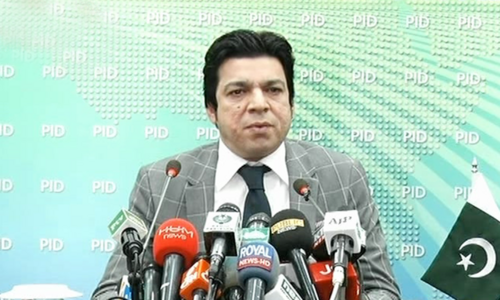ISLAMABAD: The Supreme Court on Tuesday disregarded repeated pleadings of counsel for Faisal Vawda to stay the Senate elections, scheduled for March 9, on the seat that fell vacant after his lifetime disqualification.
Headed by Chief Justice of Pakistan (CJP) Umar Ata Bandial, a three-judge Supreme Court bench, however, directed the Election Commission of Pakistan (ECP) that the result of the Senate elections would be subject to the outcome of the decision in the present case.
The Senate seat fell vacant when the PTI lawmaker was disqualified by the ECP on Feb 9 for filing a false affidavit about his dual citizenship along with his nomination papers in the 2018 general elections.
Article 62 (1)(f) of the Constitution under which the PTI stalwart was declared ineligible to become a member of parliament for life equals to death sentence for politicians, Advocate Waseem Sajjad, representing the petitioner, pleaded before the apex court.
The senior counsel requested the SC to stay the upcoming Senate election on the seat vacated by his client or decide the present appeal before March 9, the day of election.
Result of March 9 election on vacant seat will be subject to decision on PTI stalwart’s appeal, says SC
The three-judge bench, however, observed more than once that it did not like the way the ex-lawmaker furnished the ‘false’ affidavit before the ECP to claim that he was not a dual national at the time of filing of his nomination papers for the 2018 general elections.
The only relief the CJP-led bench could give to the petitioner was to direct the ECP that the result of the Senate election would be subject to decision in the present case.
The court, however, summoned Attorney General for Pakistan (AGP) Khalid Jawed Khan under Section 27-A of the Code of Civil Procedure, 1908 to assist it. Notices were also issued to the respondents, namely the ECP, Advocate Mian Asif Mehmood, Qadir Khan Mandokhel, Mian Mohammad Faisal and Dost Ali Jessar.
Mr Vawda was not present in the courtroom, where his challenge was heard.
“You (Vawda) put in a run even in the high court,” the CJP remarked while pointing towards the counsel. The court did not like this, he added.
The court also did not fix next date of proceedings after hearing the initial argument and issuing notices.
The defence counsel repeatedly asked for staying the election, otherwise, it would be a futile exercise even if the court decided in favour of Mr Vawda as by then a new member would have been elected on the vacant seat.
The court considered the petition as a case of first impression because it involved exercise of judicial powers by the ECP of holding the legislator disqualified for life.
Justice Mohammad Ali Mazhar, however, observed that the interest of the petitioner had been taken care of in the order dictated by the court, whereas Justice Sajjad Ali Shah regretted that Mr Vawda had tendered his resignation from the National Assembly seat from Karachi just moments after voting in the election of Yousuf Raza Gilani as senator only to render infructuous a quo-warranto petition against him. “We have noted the conduct of Vawda,” observed Justice Shah.
The counsel then tried to explain his client ‘genuinely believes’ he had declared truth to the best of his knowledge in the nomination paper, but the court declared that the renunciation certificate was a requirement while filing the nomination paper before the 2018 general elections.
During the hearing, the CJP observed that the court would consider that the ECP had created a lifetime bar when there was no appeal available.
The counsel argued that the ECP did not have the jurisdiction under Article 218 (3) of the Constitution and Section 8(c) of the Elections Act, 2017 to disqualify his client for life under Article 62(1)(f) of the Constitution and de-notified Mr Vawda as a senator with a directive for him to refund all the perks and privileges he had received while holding the office of National Assembly member.
The counsel argued that in the 2018 Samiullah Baloch and 2020 Allah Dino Bhayo cases, the Supreme Court had held that any finding under Article 62(1)(f) must be recorded by a court of law after conducting a proper trial, and the ECP did not enjoy the power to disqualify for life under Article 218 (3) and Section 8(c) of the Elections Act.
He elaborated that the ECP only had a transitory power under Section 9 of the Act to take corrective measures in respect of the matters concerning process of elections, including possible disqualification, but there was a sunset clause of 60 days after the notification of a return candidate was issued by the ECP.
Published in Dawn, March 2nd, 2022















































